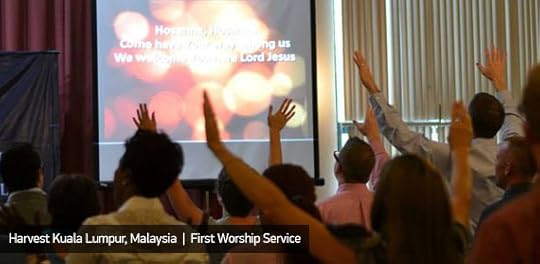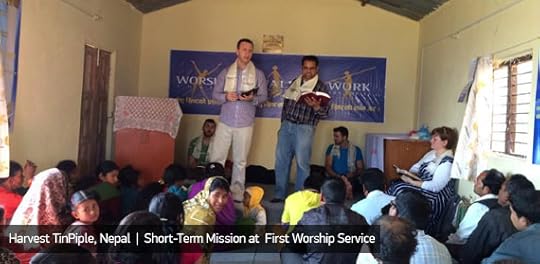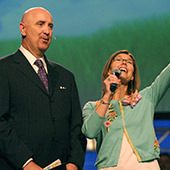James MacDonald's Blog, page 8
April 17, 2014
Vertical Passion Week
What distinguishes Passion Week in a vertical church?
1: Passion Week is a week, not a day or a weekend. We give our people special materials and devotionals to work through personally. We give them music to listen to on their way to church. We are a church family and we love to remember and, ultimately, rejoice together. Check out the website TheDayJesusDied.com, where you will find our Good Friday service from last year and the devotional we led our congregation through this year.
2: The primary goal remains the exaltation of Jesus Christ—not the winning of lost people, which is a byproduct of God’s manifest presence and never the primary goal. (More on this: “Unafraid Witness” from Vertical Church.)
3: The focus on the cross and “Good Friday” is as important as the empty tomb and Easter celebration. At Harvest we’ve built a culture of somber reflection surrounding Good Friday services. People travel great distances to our original campus from all over Chicagoland, yet the attendance is 4/5 of our Easter totals. Everyone wears black, enters in silence, and leaves in sorrow. The service has not a moment of victory or celebration, because that’s the way it was originally. Not a single melody of joy, not a note of triumph! The cross and death of Christ are only seen as good—the greatest good—looking back. For the first disciples, the death of Christ was the end, the loss of who and how every hope might find fulfillment. They DID NOT KNOW or understand that Christ was not finished personally when He said “It is finished” (John 19:30).
Good Friday reflection is like being pulled back in a slingshot. Looking into the empty tomb and rejoicing from the depth of your soul are massively amplified through your heart awareness of what sin’s payment cost God’s Son. Of course you don’t need a service to do that, but it is our joy to serve our people by leading them down the road of suffering as a preparation to shout “Hallelujah!”
The Good Friday service is creative and immersive. This year our gifted media department, under Dallas Jenkins, has developed a short film to guide our reflection. Check out the trailer here. So excited.
(Please open the article to see the flash file or player.)
4: On Sunday, nothing is subtle or secretive. Christ is Risen! Proclaim it from the house tops! People will show up with signs and banners and bright clothes. They will make themselves hoarse singing and shouting and celebrating from the bottom of their hearts. We try as best we can to follow the mental/emotional cycle of the first disciples that very first weekend. The music will be incredible and celebratory. The Vertical Church Band and hundreds of volunteers will be out in force taking the good news to each of our campuses across this great city. No felt needs, no subtle explanation to avoid offending people dragged into church against their will.
The compelling thing about the resurrection of Jesus is its life-altering, irrefutable reality. Don’t apologize for it or give the impression that lost people need to appreciate it. Lead the saved to celebrate it, and the Lord Himself will descend in saving power and call to Himself those He has been drawing. Get fired up yourself, Pastor. Think long and deep about the awesome, history-altering event. This spring I am concluding our two-year study in the Gospel of John. I will be preaching for six weeks on Christ’s six resurrection appearances.
5: Pray and lead your people to pray for God’s manifest presence in church this weekend. “Oh that you would rend the heavens and come down, that the mountains might tremble at Your presence” (Isaiah 64:1). This is Easter number 26 for Kathy and I at Harvest Bible Chapel, and I am undiminished in my delight. Listen my pastor friend, you may not have a parking problem or an overflow room or a shortage of bulletins. You may not have a 100-voice choir or a world-famous soloist or an orchestra or a movie (you can use ours next year). But you have the living Christ, you have the bloody cross and the empty tomb, and you can revel in that personally and from the pulpit just as much as any other preacher. I remember well the first time (year 5) we had to bring a few extra chairs into our single service in a small, rented high school auditorium.
Let our Father observe you seeing and savoring personally what we are leading others to celebrate. Pray now, and continuously ask the Holy Spirit to fall upon your church in power, because “when they had prayed, the place in which they were gathered together was shaken, and they were all filled with the Holy Spirit and continued to speak the word of God with boldness” (Acts 4:31).
It’s going to be another AWESOME Easter.
James
April 9, 2014
Just as He Promised, Building His Church
“Go therefore and make disciples of all nations, baptizing them in the name of the Father and of the Son and of the Holy Spirit, teaching them to observe all that I have commanded you . . . ” (Matthew 28:19-20a)
I believe the ultimate end-game of all disciple-making is church planting. That the mission of the church is missions, and the mission of missions is the church. That every ministry effort in and outside our church is to be viewed through the lens of making and strengthening disciples, some of whom the Lord will call to plant new churches, that make more disciples, who will plant more churches . . . and so on, until He returns.
Since our first daughter church was planted in 2000, God has shown tremendous favor on Harvest Bible Fellowship, our church planting ministry. I want to share some of the awesome things He is doing in and through our Harvest churches right now.
MALAYSIA: By God’s grace, early this year we experienced the groundbreaking launch of Harvest Kuala Lumpur in Malaysia, the first Harvest Bible Chapel in a Muslim country.


CUBA: In March, another amazing door opened as Harvest Bible Fellowship was granted access to Cuba, to strengthen the disciples of the developing Harvest Bible Chapel in Holguin, who are preparing to launch later this year.

HAITI: Last weekend, the first Harvest to be planted in Haiti saw the most unprecedented launch in the history of Harvest Bible Fellowship. More than 1200 people packed out the first service of Harvest Jacmel and, as Jesus was exalted and Pastor Abraham Comper shared the gospel, five people responded by giving their lives to Christ.
There is a sense that this is just the beginning of something incredible happening in Haiti. Our hope is that many believers, leaders, ministries, and life-giving, Christ-exalting churches will be established and multiplied in the years to come. There is also the sense of an evil at work seeking to devour the Word implanted and the church, we are confident God is stronger and able to fulfill His purposes in this new body of believers.


NEW CHURCHES: By the end of May, Lord willing, six different countries will be home to eight new Harvest churches launched in 2014: Malaysia (1), Nepal (2), Haiti (1), Canada (1), Nicaragua (2), and United States (1). It is the Lord’s doing and it’s marvelous in our eyes. If that wasn’t marvelous enough, Harvest Brantford, Ontario, Canada, will be the 100th Harvest Bible Chapel! WOW! God has been so good and gracious to allow us the awesome privilege of partnering with Him to plant 100 churches in the past 15 years. Congrats to Harvest Brantford and Pastor Kevin Weeks for being #100. We’re praying for these new churches as God carries the message of eternal life in Christ through their ministries.
“And on this rock I will build my church, and the gates of hell shall not prevail against it.” (Matthew 16:18)
As Walk in the Word goes to television, we’re prayerfully anticipating a significant and global impact on our ministry of making disciples and planting churches. Not only will our teaching enter into 94% of homes in North America and be broadcast around the world, it will reach several unreached countries that are closed to the gospel. Our hope is that as disciples are made and matured through sound, practical, biblical teaching, they will be stirred to plant and be part of new, life-giving churches—and we are trusting God alone for the outcome.
MORE NEW CHURCHES AND OPPORTUNITIES: From June through year-end, 11 more Harvest Bible Chapels are scheduled to launch around the world in United States (6), Canada (1), Cuba (1), Mexico (1), and Nepal (1). All told, 19 new churches will be added to our Fellowship in 2014, and opportunities for future international churches are being explored with interests coming from Cameroon, Kenya, Romania, Nicaragua, and Liberia.
SHORT-TERM MISSIONS: Perhaps less-glamorous, but just as awesome—in the midst of their own faithful ministries, our Fellowship churches are outdoing one-another in serving through short-term missions. This year we’ll see more than 40 teams from various Harvest churches go to serve another Harvest in the U.S. or internationally. Many whose lives are being greatly impacted by seeing firsthand what God is doing through our churches worldwide are coming home renewed in their commitment to the Lord and to serving in their own church.


Pray for us as we continue to press on and lay hold of these immense responsibilities. I hope that hearing about what God is doing in our midst is an encouragement to you today. Be faithful in the field where He has placed you—and trust in His grace and provision for the next step He is calling you to take for His purposes and glory.
But one thing I do: forgetting what lies behind and straining forward to what lies ahead, I press on toward the goal for the prize of the upward call of God in Christ Jesus. (Philippians 3:13-14)
March 31, 2014
Walk in the Word on Television
Today we have an exciting announcement about Walk in the Word, our broadcast ministry heard on nearly 1200 radio outlets around North America. Beginning May 4, 2014, on Sunday mornings, then in addition on every weekday morning starting September 2014, Walk in the Word TV will be seen around the world on both The Trinity Broadcasting Network (TBN) and the The Church Channel (TCC). This decision was approved by our Elder board in February after many months of study, reflection, and prayer. It was then shared with 750 of our primary church leaders and finally to our congregation in March of this year.
I would like to give you an overview of how the Lord has brought us to this exciting expansion of our mission to impact lives for Christ and plant 1000 churches in our lifetime.
Patience and Prayer.
Back as far as 2007 we recognized that many places in which we hoped to plant gospel-preaching, Bible-believing, Christ-adoring, vertical churches could not be accessed by radio. Often there was not a strong radio station, or it played only music, or no time slot was available to us, or it was cost prohibitive. In 2010, during our spring bus tour, we invited supporters to give to the vision of Walk in the Word TV. Those offerings were set aside in faith as we waited and prayed for an open door to expand our impact and church planting emphasis through television. As we inquired and investigated and prayed and waited, there continued to be no open doors. So we prayed and waited again, asking the Lord to open a clear and obvious door. Then suddenly and miraculously, where there had previously been no interest among broadcasters about Walk in the Word TV, God began to open doors of opportunity through a friend in Jerusalem, a friend in Texas, and a long-time friend in Orlando.
“I will open a door for you that no man can shut.”
Revelation 3:8
Preparation and Pruning.
For the past 3-4 years we have been slowly building a staff team that could support an expansion to television. Production staff, audio and video professionals, expanded call center plans, etc., have been carefully put in place to support the current ministry and be available to stand behind this expanded opportunity. With this opportunity has come the question, “How can you find enough time for this and still take care of yourself, your family, and the church?” In God’s providence, our leaders were already asking this question last year, as the operational oversight of our church had grown too large for me to continue to lead and still fulfill my primary callings to preach and pastor. Following a national search that brought in 125 applicants, 10-12 of whom were interviewed, we have found the Lord’s provision for this COO position.

Scott Milholland, on April 16, starts in his new role as Senior Executive Pastor over all ministries and operations associated with Harvest Bible Chapel. This reallocation of my responsibility is fully supported by our Elders and allows me to focus completely on my preaching/teaching ministry and pastoring/mentoring next generation leaders in our church and Harvest Bible Fellowship.
“Every branch that bears fruit, He prunes it so that it may bear more fruit.” John 15:2
More importantly, God has been preparing my own heart through an extended season of personal reflection and brokenness. Attack from outside our church was painful and relentless, but used of the Lord inside our church and inside me in some wonderful ways. Walk in the Word was merged with the ministry of Harvest bringing all broadcast ministry under the authority of our Elders. Needed adjustments were made to our governance structure, policy, and systems for accountability/support. Personally, I made significant adjustments in lifestyle and liberty to better conform to congregational expectations and prepare for even broader exposure to public opinion. Knowing the kind of scrutiny a preacher on television receives and the recognized pitfalls of such opportunities, we praise God for faithfully pruning from our lives any impediment to gospel witness. Far from elated or inflated, we are humbled and thankful to Him for the grace to persevere into this next season of expanded fruitfulness for His glory.
“Ponder the path of your feet and let all of your ways be established.”
Proverbs 4:26
In recent years we have learned the importance of carefully considering all ministry association in order to maintain the confidence of our church family and ministry supporters around the world. We are conducting a thorough review of like-minded ministries that have gone before us onto TV outlets. Men like David Jeremiah, Greg Laurie, Tony Evans, and Jack Graham have all expanded their broadcast ministries in this direction in a way that only enhanced their local church ministry. We praise God for these like-minded men who have modeled fidelity to Scripture and to high-integrity, biblical, local-church ministry while impacting the world for Christ through television. With God’s help it is our prayerful intent to follow in their footsteps as they have faithfully followed Christ.
Provision and Potential.
To repeat, starting May 4, we’ll begin taking our expository teaching ministry to the world through television. Walk in the Word TV will air on Sunday mornings on both TBN and The Church Channel. Then, in September, our program will begin airing on Monday-Friday mornings in addition to Sundays, on both channels—and in the most optimal, impactful times of the day. If you knew the backstory, you would get a better sense of how miraculous and unprecedented this is for a Bible-centric ministry like ours—and what an awesome move of God this open door represents.
“A wide door for ministry has opened to me.”
1 Corinthians 16:9
This is the current coverage of walk in the Word as a radio ministry.

This will be the future coverage of Walk in the Word as a radio/television ministry.
As I often say, I couldn’t be less interested in seeing my face or people hearing my voice in more places. No one who meets me thinks, “Now there’s a guy who looks like he belongs on television.”  What we are passionately interested in, is seeing 100s or 1000s of earth-shattering, window-rattling, life-altering, God-glorifying churches planted around the world for the fame of the name of Jesus Christ. Please rejoice with us that God has moved on our behalf to open this door. By faith we are walking through it.
What we are passionately interested in, is seeing 100s or 1000s of earth-shattering, window-rattling, life-altering, God-glorifying churches planted around the world for the fame of the name of Jesus Christ. Please rejoice with us that God has moved on our behalf to open this door. By faith we are walking through it.
March 28, 2014
Don’t Miss This . . .
There is no more reliable indicator of the success of a child than the involvement of their father.
There is no bigger drag on societies than men who refuse to work.
Women outnumber men in college. And the church. And the workforce.
I could provide scholarly studies and statistics to back those claims up, but I’m guessing you are already see it anecdotally right in front of you.
Men are struggling. Can we fix this?
We can do something.
Spiritual growth happens in crisis and in process. Both are needed in correct dosage for continual growth. While churches fill their calendars with catalytic events for students and women and marriages and many more, over time the push to get men away from the distractions of life and call them to repentance has gone cold.
A common burden for the men in our day in North America birthed the Act Like Men conference in 2013.
This fall we are coming to Phoenix and Dallas.
Pastors, we want to help the men in your church. We would love the privilege to meet you and dream together about how at our upcoming pre-events in both cities. Please register here and let us help shoulder your burden for the men in your congregation. Hope to see you there.
(Please open the article to see the flash file or player.)
March 21, 2014
Vertical Evangelism—Believe It!
Hey Pastor:
Maybe in recent years you’ve fallen prey to the false dichotomy of worship vs. evangelism—the idea that if you really want to reach lost people in your weekend worship, you have to get all topical and catchy and felt-need about everything. Not true. God Himself is the great evangelist; He alone causes the growth (1 Corinthians 3:7).
Where Jesus Christ is unashamedly adored, God is drawing people and saving them. And the ones He is reaching are the precious broken people who don’t need technology-driven entertainment and tweaking of their life skills. They need the good news, and dramatically find it, and the church is edified, and Christ is glorified. That’s vertical church—it’s a slower path to a higher place. For the Vertical Church chapter on evangelism, click here.
Are you on that path? Watch this awesome ‘only God’ story, and preach Christ crucified and risen with all that the human heart is looking and longing for. I hope the video below blesses you as much as it did our church. Praise our Saving God.
(Please open the article to see the flash file or player.)
March 19, 2014
Short Post—Incredible Person!
Proverbs 3:27: “Do not withhold good from those to whom it is due, when it is in your power to do it.”
Ok, I won’t!

Today is my wife Kathy’s 5?th birthday. She is the rudder on the ship of our family, the shelter in a storm, the oasis in a desert, the topping on the already great sundae of serving Christ and His church.
A pretty, but pretty regular kid from a broken home whose father was in prison when she was born. Kathy grew up in a violent home, but was gloriously saved by Jesus Christ at the age of 15. She has withstood every onslaught of 30 years in ministry with joy and integrity and endurance. Christ has been powerfully working in and through this woman for . . . can I say it? Soon to be . . . ummmm, many years. 
div.loltos a { display:block; width:170px; height:170px; float:left; margin:0 10px 0 0; }



I could say so much more, but . . . truly “her children rise up and call her blessed” (Proverbs 31:28). Our oldest son Luke is blogging now and I love the way he says it in his post, “My Mom.”
March 12, 2014
The Danger of Reductionism in Preaching
As a recovering addict of overstatement, I want to be careful in the words I choose to warn fellow ministers about the danger of reductionism in our preaching and teaching. Dictionary.com defines reductionism as: “The practice of simplifying a complex idea, issue, condition, or the like, especially to the point of minimizing, obscuring, or distorting it.” Few things discourage young Christians, or those considering the faith, more than an over simplification of the many complex issues current residents of this planet are grappling with.
Can You Emphasize a Theme Too Much?
Reductionism is where you make a main thing into the only thing or make a partial thing the whole thing. To be sure, effective preaching does not demand we untie every knot of human depravity, and main gospel themes should always punctuate biblical sermons. At the end of a difficult message on an important subject, we don’t assist the Holy Spirit in applying the Word by jumping to the conclusion: “It all comes down to the cross.” Yes, the cross—yes, the cross lifted and central, and God forbid that I should glory in anything other than the cross. And yes, Jesus Christ crucified and risen at the center of our faith and every sermon. YES! Those are sentences that affirm the gospel as the main truth about Christianity.
However, we do not advance cross centrality by reducing the main thing to the only thing. The cross is not the only message in the Bible, and it is therefore not the only thing God wants us to preach. Roles in marriage, instruction on conflict resolution, patterns of behavior that God affirms or condemns, the importance of grief in loss, the reality of emotional cycles, the importance of selfless service to a King and a kingdom, and why that matters, are just a few of the many biblical messages that cannot be neglected. Asking the cross to epitomize and carry the application for all biblical content makes the cross smaller not larger, because that degree of emphasis is not actually biblical—it’s reductionism! We are guilty of reductionism when we force main biblical themes onto all subjects or preach only a preferred portion of God’s Word on a complex subject.
We’ve All Made This Mistake
Let’s say you have been teaching on marriage and a particular couple who really needs help sees you pull up from your sermon on roles in marriage by ending with: “It all comes down to the cross.” Really? The guy who’s cheating on his wife, because she has been defrauding him sexually for years, because he’s verbally abusive, because she’s unappreciative, because he got her pregnant and she feels immense regret and unresolved guilt, because he won’t discuss it meaningfully or go for counseling as she frequently pleads, because she embarrassed and shamed him in front of the last counselor, because he was lying to the counselor and saying things were much better than they actually were, because . . . “It all comes down to the cross”? Really?
Why Is Reductionism Such a Hard Problem to Correct?
Why then are we frequently guilty of reductionism in many forms? As pastors, in our efforts to persuade we easily lose sight of the ‘reasonable man’ and what he knows about the totality of God’s Word. When we’re not careful, we slip into arguments that inflame the passions of those who are less familiar with the Bible but never seem to tire of punchy, overly-simplistic sermon conclusions. The biblically reductionistic sermon arouses passion, but can push the obedient listener toward ‘private interpretation’ (2 Peter 1:20).
Money: A Common Example of Reductionism in Preaching.
Few subjects are as consistently distorted by reductionism on all sides as preaching on money. If your text is Ecclesiastes 10:19 by itself, you can preach money as the ‘answer to all things.’ Add in a couple of verses like Proverbs 10:22, “The blessing of the LORD makes rich, and he adds no sorrow with it.” Next, make a couple of biblical terms like “favor” and “blessing” synonymous with money (which they are not) and blammo! Before you know it, you are falling fast into a prosperity theology (a fairly obvious error) that promises things God doesn’t, fails to reckon with the serious biblical warnings about materialism, and pushes your people into “many foolish and harmful desires that plunge people into ruin and destruction” (1 Timothy 6:9). Prosperity theology may be fueled by the sin of materialism, but it is grown in the soil of reductionistic preaching to people who don’t know their Bibles.
More subtle, because it is not equally dangerous, is the increasingly common ‘poverty theology sermon.’ Here the pastor is not typically looking at an urban-poor church that seeks biblical insight on financial freedom. In poverty preaching the pastor is more frequently standing before a suburban congregation that is already sinking in the morass of materialism. Further, because the most common New Testament teaching on money is to warn of its danger, the pastor is on solid ground, provided he doesn’t stay there exclusively and never preach anything else about money.
A single message or even a series on “Jesus is our treasure, give it all away, love of money is evil, run for the hills” is no doubt needed to get the attention of hardened hearts. However, an exclusive diet of this message paints the biblical portrait of money with a single color—when the palette available scripturally is a kaleidoscope. It overlooks the New Testament teaching on stewardship (1 Corinthians 4:2), shrewdness (Luke 16:8), providing for your own (1 Timothy 5:8), and our Master Jesus’ insistence that He get a return on His investment (Matthew 25:14-30). Poverty theology may be fueled by the sin of fear, but it is grown in the soil of reductionistic preaching to people who are apparently not aware that a much fuller view of money flows from the pages of God’s revelation on the subject.
Don’t Over Correct
Now don’t get all fired up and run in the opposite direction. It would be reductionistic of me not to add that the opposite error is equivocation, where we can’t stand firmly on any truth without running to the other side of every subject. To be sure, equivocation can be as damaging to a message as reductionism. Pastors who circle endlessly, gathering up perceived objections and interpretive options, are damaging the power of simple proclamation. Concern that people will misunderstand because I didn’t tie up every lose end damages the impact in preaching by reducing clarity. So let’s not over correct and run to obfuscation as our new wrap up this weekend, okay?
Let’s just be careful about reductionism. Praise God for the main things—the gospel, the cross, Christ as Lord—but remember those are not the only things in the Bible. Reductionism may make you popular, but it won’t make you faithful. Let’s preach every passage just as it is written, without equivocation. But let’s be sure over time we are preaching the whole counsel of God, not indoctrinating our people into little sectarian backwaters that favor our preferred emphasis. We can do better than that for our people and for the Lord, and we must.
February 26, 2014
Preacher Thoughts on Tone, Criticism, Scripture, Confession and Valentine’s Day
Random thoughts (no doubt related to conscious thoughts) are constantly in a pastor’s mind. What do I think about that? How should I handle this? Which approach is most Christ-honoring, most helpful, most impactful? I have no idea if any of what’s banging around in my head will connect with or assist your thinking today. But hey, I’m gonna try, if only to experience the benefit of getting my own thoughts ‘on paper.’ Here they are, with the prayer that I can be a blessing to you and your ministry.
Shepherd, Teacher, Prophet
Shepherds comfort and encourage with the Word; teachers explain its meaning with clarity, forming a solid doctrinal foundation for life in Christ; prophets call out sin and exhort us toward holiness. Each of us as preachers, by personality and practice tend to entrench one of those tonalities in our preaching. But what if you let the Word of God set the tone for your message this weekend? Effective preachers are asking not just “What should I preach,” but “How should I preach it?” Your answer to the second question will migrate toward your most common tonality, if you’re not intentional. Surely we should not be preaching the comforting words of John 11, where Martha and Mary are weeping, with the same tone as Jesus’ address to the Pharisees in Matthew 23. If the passage is bringing comfort as a shepherd would, make sure you match that gentle pastoral tone which communicates care and supportiveness. If something is being taught that is prophetic, bring the thunder as a prophet would, calling the people to God’s holy standard without apology. If the passage is complex and/or doctrinal, slow down and take the time to teach them the Scriptures with careful attention to understanding. Which tone/approach comes most easily to you? Many sermons require all three, but take the time to locate the dominant tone of the text reaching past your ‘go-to’ tonality to match the tone of the text. Your people will be better served, and God’s Word will be more effectively and accurately communicated.
Keep Your Exhortations about Fellow Pastors Out of Public View
As Christ followers, we don’t criticize brothers or sisters in Christ publicly. Not on Twitter, not on blogs, not by name, certainly not from the pulpit—not ever. Discussing issues and debating doctrinal variances can be edifying. But if the matter is personal, even if the error has become public, we still allow ‘love to cover’ (1 Peter 4:8) and go to the person privately. If we don’t have or can’t get access to the person, we pray that someone with access will be faithful to their responsibility and bring the needed correction—but we don’t air our dirty laundry. If the person needing correction is a false teacher (error that threatens the gospel), then public warning may be called for; but love for God’s family, witness before the world, and biblical understanding of Christian relationship calls for rebuke of brothers to be private, not public. Don’t let those who see it differently egg you on to ‘take a stand.’ Stand for brotherly love and get off your soap box. I could give examples of fellow pastors who need to hear this, but that would violate the principle I am sharing here, wouldn’t it? I could give past examples of where I failed in this, but that would only repeat the error of public rebuke, when private reproof is what the Scripture calls for. Read a fuller post on this here.
Reading the Scripture during Worship
A recent post described the powerful impact of Scripture reading that is carefully prepared and given during worship. I remember Haddon Robinson reproving the class during my doctoral program about the negative impact of reading Scripture poorly in public, and all that is lost when that happens. See below the elevated impact when the Scripture is actually memorized by the worship leader and declared with biblical authority over the people. How awesome to elevate the Word of God during worship. How impactful for worship leaders themselves to be encountering the Scriptures in such profound ways. Glory to God.
(Please open the article to see the flash file or player.)
Admit When You Are Wrong
Why are pastors so reluctant to admit their error? James says: “We all fall in many ways” (James 3:2). Don’t stick your head in the sand; don’t run for cover and ride it out. Reach for the mea culpa and admit when you are wrong. Don’t worry about giving fuel to critics; focus on giving fuel to God’s favor on your life/ministry. Confession in a Christian is good for the soul—and confession in a pastor’s mouth is good for him and the whole congregation. When your actions send a message that is different than your heart, change your actions and confess the error in judgement. When your behavior is rightly criticized, don’t fire back or counter the attack; admit your failing and turn away from it, maintaining your faithfulness to Christ and His Word. It’s not your unfair critics or your always-enthusiastic supporters that you should listen to most. Between those extremes are the majority who don’t think you’re perfect and won’t bail on your ministry just because you handled something poorly, or verbalized it badly, or prioritized it weakly. The vast majority of people in your church just want to know you are listening to God and others, and being sanctified by Christ as they are. Admit when you are wrong and change what you can—that goes a long way with godly people, and it accelerates God’s purposes in you.
Are You Preaching the Word “in Season”?
I have always focused on “preach the Word . . . in season and out of season” (2 Timothy 4:2). While the original language in that passage means literally “good time not good time,” and the context is addressing apostasy, we can consider more than that in choosing what to preach. When I was much younger I used to be frustrated by the Christmas interruption to business-as-usual exposition, let alone times like Memorial Day and Valentine’s. For too many years, I let those and many other special seasons on the calendar pass without mention or observance of any kind. I think, as a young pastor, I was so passionate about faithfulness to the routine, I didn’t want to vary the pattern for any reason. More recently, though, I have seen the benefit of trying to get biblical mileage out of important subjects the culture is discussing because the calendar has raised it. Without question, more people are thinking about marriage at Valentine’s Day—so we did a special event recently to minister to our people in that vein. We are planning some summer ministry this year that will connect with people when they are outside and enjoying the weather. We do a summer day camp for kids, called “High Five,” and a fall festival that brings families together. Faithfulness to Scripture is the priority, but that does not mean you can’t, on occasion, choose subject matter already on your people’s minds because the culture has spent billions of dollars drawing it to their attention. “In season and out of season” should include faithful consideration of the best seasons to gain ground on particular subjects with your congregation.
That’s some of what I am thinking about now—hopefully you found something helpful in the ‘brain dump.’ Stay faithful to Jesus, stay focused on His Word, and pay attention to your ministry today. That’s what I’m trying to do.
“Practice these things, immerse yourself in them, so that all may see your progress” (1 Timothy 4:15).
February 17, 2014
Jesus Christ is Stronger!
Ok, here’s the truth. I was a really skinny kid. To look at me now you wouldn’t know it, but my arms were like pipe cleaners and my legs like pick-up sticks. Really. I was embarrassed at swimming parties and felt ashamed to wear my basketball jersey ‘cause my shoulders could barely keep the straps up. I remember going to picnics and participating in tug-o-wars with futility. A close personal friend, who was as strong as I was weak, could grip my wrists and slap me silly with my own hands. I know the feeling of physical weakness and it is very uncomfortable.
Way back then I could never have admitted what I have just shared with you. I think the reason I can easily do so now is because I’ve discovered a weakness far more distressing than a physical one; I have observed the weakness of my soul. Doubting when I should believe, striving instead of resting and trusting, trying like a first grader to ‘do it myself,’ when I should be on my knees pleading for the strength that is perfected in our weakness—if we would just humble ourselves and ask for it. Do you relate? Ready for some good news?
Jesus Christ is strong to save!
Strong enough to save me from my fears about the future or my shame over a past that cannot be altered, though I wish so much I could do some things differently.
Stronger than my tired prayers with well-worn phrases and weary pleas.
Stronger than my need to check the boxes of uncertainty so everything can be settled.
Stronger than the enemy of my soul whose fiery darts pressure me to think about profitless things.
I remember the first time I heard the song “Strong to Save,” written by our Vertical Church Band. Seth was singing, worshiping passionately—and I was needing a fresh faith connection with the God of the universe, who never grows weary and offers His strength in the face of what seems impossible to us. WOW! Such a simple truth—Jesus Christ is strong to save.
“Strong to save from what?” you ask. Strong to save from whatever would cause you doubt or discouragement today. I listened to the song again this morning alone in my office at home. The words filled my soul and forced my hands into the air in heartfelt worship. Tears in my eyes and a broad smile on my face. Jesus Christ is above all death, above all life, above the battles that we fight, above any other name—our God is strong to save. Above the heavens and the earth, above the rulers of this world . . . Yes, yes! YES, He is!!
Play the song below. Listen to it and bow before the God who made you. Confess your weakness as a servant of the gospel and ask Jesus Christ to move in obvious strength above all that weighs you down today. Tell the Lord how hopeless and helpless you are without a steady infusion of His strength. Ask for it, believe you have received it, and go in that strength to serve Christ’s church this week.
(Please open the article to see the flash file or player.)
January 30, 2014
Why I Don’t Preach Sometimes

Dear Pastors and Ministry Leaders:
Thank you for checking in regularly. I hope this blog is a source of strengthening for your resolve to serve Jesus with abandon, no matter the cost. And I pray this blog resources your fruitfulness in our common mission to plant and pastor disciple-making churches.
Kathy and I just returned from a three-week mini-sabbatical and are praising God for the refreshment of body and soul we’ve received. August through December was an exhausting stretch for us. And while we honestly hate to be away from our church family, we have learned that the discipline of silence, where we totally cease from preaching, is an essential ingredient to longevity in ministry. Is it possible you are working too hard and serving too much? Here are some reasons why regular ‘breaks’ from the preaching/teaching that interrupt the routine are a must. By breaks I mean more than ‘one-off’ weekends. I mean two or three times per year, when you are out of the pulpit for 2-3 weeks consecutively and don’t appear on the platform or in the lobby at all.
1: When you interrupt weekly preaching you can focus on feeding your own soul.
Pastors, we are Christians first and ministry leaders only secondarily. One of the biggest struggles of being a lead pastor is that you spend a lot more time giving out than taking in. Sermon prep is a feeding of sorts, but not the way the rest of the church experiences it. Every member of your church gets to sit and listen to the proclamation of God’s Word on a weekly basis. Podcasts and online sermons can supplement, but it is a wonderful thing to sit in church and worship Jesus and hear His Word, as your people do weekly. Schedule regular intervals to be a church member, and you will be a better church leader the rest of the time. You can’t teach what you don’t know, and you can’t lead where you don’t go.
2: When you interrupt weekly preaching you can raise up other preachers.
Good men in your church, whether staff or volunteer, have teaching gifts God wants to develop. Most staff pastors don’t want to preach weekly, but an occasional opportunity for the most gifted among your leaders will grow them up and meet a need in their own soul. Don’t be concerned that more preaching will unsettle some and create a hunger to preach that will make them want to leave. I say don’t be concerned because that will, in fact, happen. Some staff come for decades, but most come only for years.
One of the greatest compliments to your ministry should be the number of men around the country and around the world who served under you for a season, and now want to serve similar to you in a different location. Teach the church that raising up gifted preachers and sending them out is part of the mission. It’s hard to see good men go, but trying to keep them when God is calling them out will not end well. Those who are called to lead their own churches need to know that obedience to that call will be celebrated, or they will begin to feel frustrated and chafe under a suppressive environment. Taking a little break multiple times per year will raise up other gifted preachers—and that builds the church of Christ.
3: When you interrupt weekly preaching you put the focus where it belongs.
The church should be a refuge from, not a repeat of, our celebrity culture. Even in New Testament times Paul had to resist the Corinthians who were voicing their preferences saying, “‘I am of Paul,’ and ‘I am of Apollos,’” (1 Corinthians 1:12). I have always taught our people “The messenger is nothing, the message is everything.” But few actions say that as clearly as standing down once in a while so other worthy messengers can stand up. Even the most concentrated efforts to reduce celebrity do not reduce people’s general preference for the person they hear most frequently. That doesn’t make the ‘main guy’ better, it just means people are comfortable with what is familiar. Even if they don’t shout for joy when you ‘disappear’ once in a while, the discerning will see you are weaning them off their focus on a particular messenger and discipling them to honor the Word of God, regardless of the mouth piece.
4: When you interrupt weekly preaching you can get some other things done.
Preaching prep and delivery takes about two-thirds of my time, approximately 40 weeks per year. Into the rest of the time, I squeeze: Elder leadership, staff meetings, future planning, personal development, service planning, special events, staff development, small group participation, correspondence, crisis management, blog writing, outside ministry, professional development, leader training, etc., etc. Weeks without a message to prepare are weeks when you get a lot of other ministry priorities accomplished.
Press past your fear that people will think you are not working. Pastors are always working—at least faithful ones are. During this recent break I worked 5+ hours a day, 7 days a week. I caught up on a lot of reading, phone calls, future direction, and correspondence that had been lagging for a long time. I reconnected with my wife in significant, marriage-sustaining ways that the normal routine does not allow space for. My church is counting on my enduring faithfulness to Christ and my family, and you are not ceasing to serve when you step out of the pulpit to attend to other matters. Silence the guy who says, “Pastors only work one day a week”—he is an ignoramus.  Stop running your life like a juggler or dancing bear at the circus. Be healthy, extend the life of your ministry, share the pulpit with others, and take regular intervals to focus on other important ministry endeavors.
Stop running your life like a juggler or dancing bear at the circus. Be healthy, extend the life of your ministry, share the pulpit with others, and take regular intervals to focus on other important ministry endeavors.
5: When you interrupt weekly preaching you can connect with other pastors.
I have just returned from the annual Harvest Bible Fellowship Pastor retreat in Orlando, Florida. The warmth of the weather was exceeded greatly by the warmth of the fellowship. We have now planted more than 100 churches and almost every man was there with his wife. I am absolutely floored by the character and caliber of these Christ-servants. Love, love, love each one of them, and I’m incredibly fed—and blessed to call them friends, share a meal or a convo in the hallway, and put my own life and ministry in the context of God’s work in so many others. We went to be a blessing to these pastor/wife teams, but left so stirred and refreshed in our own hearts about our common call and commitment to plant VERTICAL CHURCHES around the world until Christ returns.
This time I practiced what I am preaching to you here and did not preach a single message at the retreat. I sat in the back and listened as good men gave great challenges about specific areas of ministry. We were challenged about our walk with Christ, perseverance through suffering, evangelism, and family priorities. After each session there was a panel discussion led by pastors and their wives, and I didn’t participate in leading those either. “Wow, you’re President of Harvest Bible Fellowship and didn’t do any of the ministry at the annual retreat?” No, I did tons of ministry—I just didn’t do it up front.
Change your paradigm pastor! There are many ways we minister that have nothing to do with microphones and pulpits. Preaching will always be the main thing I do, the most important thing I do, and, I pray, the most impactful thing I do. BUT, it is not the only thing I do, and taking regular intervals of rest from that heavy load of responsibility helps me do it better in the long run. After the first weekend in January, following a challenging and busy fall of ministry in and outside our church, I was exhausted. Now, just three Sundays later, I am raring to go, chomping at the bit—and counting the minutes till I have the privilege to stand again before for our congregation and open the Word of Life. This is my 31st year of ministry and I have never been more excited about preaching God’s word, partly because I have learned when NOT to do it.
James MacDonald's Blog
- James MacDonald's profile
- 105 followers








